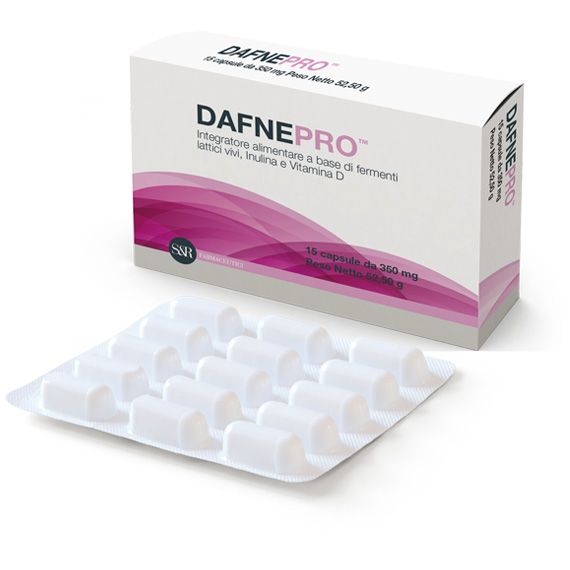PROBIOTICS

DAFNEPROTM
Encourages the replenishment of the intestinal ecosystem
Renowned for their beneficial effect on intestinal regularity, if regularly taken through specific supplements, probiotics are a valid instrument for reinforcing the immune system.
Experts of the AIIPA (Italian Association of the Food Products Industry – Food Supplement Division) Observatory reiterated this, highlighting the fundamental role of probiotics in the prevention of colds, thanks to their ability to effectively stimulate the body’s defences. Moreover, studies conducted over the last few years demonstrate how probiotics also protect the respiratory system from seasonal ailments.
The immune system includes organs, lymph nodes and defence cells which protect us everyday, especially during the coldest months of the year, from germs, viruses and bacteria: a precious ally which should be reinforced so that it can immediately kick into action, identifying and fighting the “enemy”. An acute or chronic inflammatory state of intestinal mucosa is an underlying cause of many infections, allergies or intolerances. This alters leukocyte activity at a local level which may then spread to the respiratory and genitourinary mucosa. It also well-known that stress and mood disorders heavily influence the endocrine system which in turn affects the immune system. Antibiotic treatment is a further negative factor: invaluable in the fight against specific infections, it destabilises endogenous intestinal microflora, causing more or less serious forms of gastrointestinal disorders, or if used incorrectly, the insurgence of infection recurrence phenomena and sometimes even the appearance of antibiotic-resistant bacteria.
Furthermore, according to recent studies, following a cycle of antibiotic treatment, around 30% of people experience diarrhoea: it takes around 15 to 30 days for our intestine to restore its bacterial flora balance, depending on the type of antibiotic and the duration of treatment. Therefore an imbalance of intestinal bacterial flora may weaken immune defences, resulting in vulnerability to infectious diseases and seasonal flu which cause fatigue and tiredness. In Italy it is estimated that 200-300,000 people are affected by this alteration, young people and women in particular, with an average onset age of around 30 years.
The unpleasant side effects of intestinal damage can be mitigated by specific probiotics which if administered correctly, help to rebuild intestinal flora faster, thus protecting our health. It is best to focus on certain probiotic strains with the ability to support and modulate the immune response and fight inflammatory phenomena.

The four strains of lactobacilli in Dafnepro, L. Crispatus, L. Jensenii, L. Rhamnsosus, L. Reuteri, implement the immunocompetence of the intestinal mucosa and regulate intestinal permeability. L. Reuteri in particular is considered one of few autochthonous species of lactobacilli of the human gastrointestinal tract and is used widely due to its probiotic properties, to rebalance gastrointestinal bacterial flora. The co-presence of Inulin, a prebiotic factor, and Vitamin D, which contributes towards normal immune system function, generates a synergistic effect in promoting the immunomodulating action of Dafnepro.
It is important that these “live bacteria” are contained in capsules that can transit through the gastroduodenal tract unharmed. Dafnepro gastro-resistant capsules do not dissolve in stomach acid and ensure the survival of probiotics during transit in the stomach; in this way they reach the small and large intestine unharmed, where they colonise the digestive tract, providing their beneficial action.

Useful in cases of:
>> Gastrointestinal dysbacteriosis
>> Recurring infections or relapse
>> Flu
>> Antibiotic treatments
>> Uro-genital infections